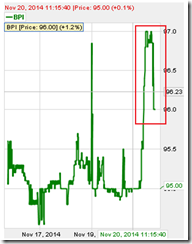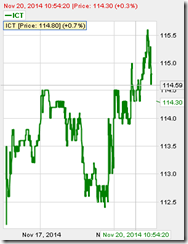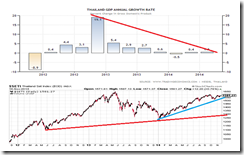1 Hunger Games Thailand edition? : When Life Imitates 'The Hunger Games' in Thailand, the Atlantic November 21, 2014
2 Geopolitical blackmail continues: North Korea Conducts Ejection Test of Sub-Launched Missile Test indicates progress in submarine missile development Freebeacon.com November 21,2014
3 The nuclear race is ON: China's Nuclear Weapons Are Getting Bigger And More Destructive Business Insider November 20,2014
4 Hasn’t it been obvious? A Russia-China Military Alliance May Not Be As Far-Fetched As Many Think Business Insider November 21,2014 They are already part of the Shanghai Cooperation Organization which according to Wikipedia “is a Eurasian political, economic and military organization”
5 Like stocks, ISIS momentum keeps rollin’: ISIS Has An Important Iraqi City Surrounded Business Insider November 21, 2014
6 ISIS draws criticism from peer (ally?) Al Qaeda in Yemen rebukes ISIS CNN.com November 21, 2014
7 If ISIS has international recruits, so does the Kurdish forces: Canadian veterans join Kurdish battle against ISIS RT.com November 22, 2014
8 US government’s favorite assassin: America’s 500th Drone Strike Launched in Pakistan Six 'Suspects' Killed in Latest Attack Antiwar.com November 21, 2014 Question is who gets killed; militants or innocent bystanders labeled as militants?
9 Oops, developing cracks on Western Sanctions against Russia? Serbia won’t join anti-Russian sanctions club despite EU pressure - Nikolic RT.com November 20, 2014
Serbia is not planning to impose sanctions on Russia, said its President Tomislav Nikolic after meeting EU Commissioner Johannes Hahn. The latter said the EU expects Serbia to bring its policy in line with the European one if it seeks to enter the union.Nikolic said that Serbia is not planning to introduce sanctions at the moment, though admitting the country is seeking EU membership which implies an obligation to pursue common policies, including foreign.
10 More beating of the war drums: Russia warns US against supplying ‘lethal defensive aid’ to Ukraine RT.com November 21, 2014
Moscow has warned Washington a potential policy shift from supplying Kiev with “non-lethal aid” to “defensive lethal weapons”, mulled as US Vice President visits Ukraine, would be a direct violation of all international agreements.A Russian Foreign Ministry spokesperson said that reports of possible deliveries of American “defensive weapons” to Ukraine would be viewed by Russia as a “very serious signal.”
11 More testing of tolerance limits: NATO scrambles jets 400 times in 2014 as Russian air activity jumps Yahoo.com November 21, 2014
12 The slippery slope to totalitariansism: Terror Is Also Not a Reason or Argument for Foreign Wars Michael S. Rozeff Lew Rockwell Blog November 21,2014
Writes Michael Rozeff
But terror and terrorists cannot possibly justify such wars, and preventive wars at that. Terrorists are a problem that is unsettling, but it also has limited and sporadic sources, even if they can inflict great damage at times. The problem requires identification and location of terrorists. How can war, which is such a blunt instrument, an instrument of mass destruction, be justified against such a threat? How can the U.S. possibly use terrorist threats to justify the unseating and destroying of entire governments, the destroying of whole infrastructures, the throwing of countries and societies into massive turmoil, and the killing and wounding of innocent civilians in large numbers? How can the U.S. justify exacerbating religious and ethnic differences, ruining landmarks and turning countries into armed camps engaged in internecine warfare? There is absolutely no excuse for this. Terror, terrorism, terrorists and terror events provide absolutely no excuse for such huge human rights violations. 9/11 doesn’t justify this. Nothing can be brought forward that justifies it. There is zero moral justification for what America has done in the name of fighting terror.Here at home, the federal government has militarized every force within all of its many agencies that do any kind of policing. Not only have local police forces become militarized, but so have every possible arm of the federal government. The Department of Homeland Security is but one umbrella for these many forces. By one count there are now more than 70 such militarized federal agencies.The government has used terror and terrorism as an excuse or pretext for militarizing itself and arming itself to the teeth. These forces stand ready to dominate Americans at every turn and create a nightmare police state in this country. Any excuse from a bomb threat to a hurricane can be used to mobilize one or more of these forces. One vindictive word or one phone call can unleash a number of SWAT teams against some innocent person or get them detained or get their names placed on a no-fly list or some other list.




.bmp)

















